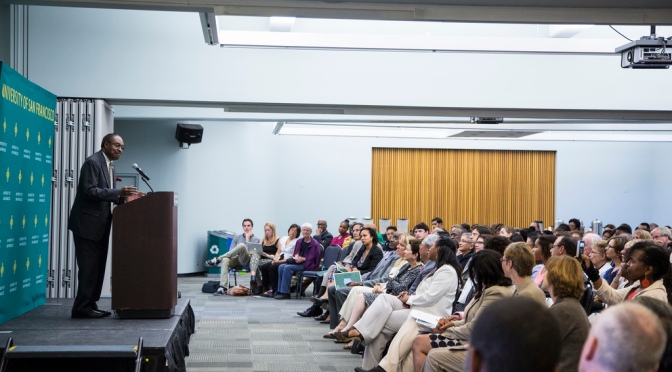“Stop the violence, stop the violence, STOP THE VIOLENCE,” rumbled Clarence B. Jones, personal lawyer and speech writer for Martin Luther King Jr., in his deeply resonating voice Tuesday evening. He spoke in reference to the general struggle for future justice. The evening event was organized to celebrate the major strides our country has made in terms of racial and economic equality since MLK delivered his “I Have a Dream” speech half a century ago, but also to understand the problems that lie ahead.
Citizens from across the Bay Area, including politically distinguished Mayor Edwin Lee and City Administrator Naomi Kelly, gathered to join Jones in commemorating the 50th Anniversary of the March on Washington for Jobs and Freedom, a day that changed America forever.
Jones has become not only a greatly appreciated historical embodiment, but also a prominent figure of the campus community, serving as USF’s Diversity Scholar Visiting Professor. He teaches the classes, “From Slavery to Obama” and “The Art of Advocacy Speech Writing.”
Led by social activists, the March on Washington was a protest to challenge unemployment and poverty, and to refute the discrimination faced by African Americans. Nearly 250,000 citizens tramped the streets from the Washington Monument to the Lincoln Memorial, where MLK delivered his famous “I Have a Dream” speech. Clarence B. Jones stood directly behind him.
Leading up to Jones’ remarks Tuesday evening, John Trasviña, the new Dean of USF’s School of Law, outlined the progress made in terms of economic opportunity and racial equality in America. He recognized that although many African Americans have risen above the “shackles of poverty” that once confined them, there is still much to accomplish. “Our job today is for the answer in [the near future] to not just be yes we can… but yes we did,” concluded Transviña.
As 82-year-old Clarence B. Jones approached the stage, the audience fell silent in anticipation. He began by singing in his deep, raspy voice, “Oh Freedom Over Me,” a hymn Jones said was signature during the Civil Rights Movement.
Although parts of his speech expressed his deep gratitude for the progress made, he too recognizes that we are far from perfection. “Our nation is awash in guns,” he said. “We can choose to be bystanders, cover our eyes and ears, or become provocative to meet the challenge of nonviolence that Dr. King presents to us.”
Johnny Chibnall, senior politics major, was honored to be in the presence of someone so influential. “[This event] is really indicative of what we do at USF. It’s opening the doors for a lot of different people and making sure that everyone’s voice is heard.”
Jones has a special connection to USF and the Jesuit mission. He remembers Dr. King speaking of a Father Oscar Romero in El Salvador, an “extraordinary man” who wrote and spoke publicly for those that experienced violence during the Salvadorian civil war. Jones says he has traveled all around the country, “but it’s USF that has a monument [dedicated] to Jesuits that were slain in El Salvador,” he stated. “And those monuments at the Lincoln Memorial are a reflection of the soul of USF.”
“We always talk about social justice, and having an event like this – where you hear stories and you see the individuals that impacted them and how it can impact us – really makes that goal and why we’re here more tactile,” said Maddy Meininger, junior politics major.
While numerous speakers indicated their concern for the injustices that still exist, Mayor Lee expressed his hope for the thousands of jobs that have been created exclusively in San Francisco under his leadership. He thinks that public education is at the heart of the city’s dignity, and that no one – regardless of race or class – will be left behind. “Every time we accomplish something good, we say, what’s next? We will not turn back until everyone is taken care of,” said Lee.
Students were unanimously impressed by this historical evening. “It was fulfilling for me to see Clarence B. Jones, someone who was at the forefront of bringing about such change and ultimately impacted so many lives across this nation for the better,” said junior communications major Henry Thompson following the event.
Fifty years after the March on Washington, Jones remains fervent in his fight for justice. He invited the audience to let its voice be heard on the issues of today, because, “If the surviving lions don’t tell the story, the hunters will get all the credit,” said Jones.


